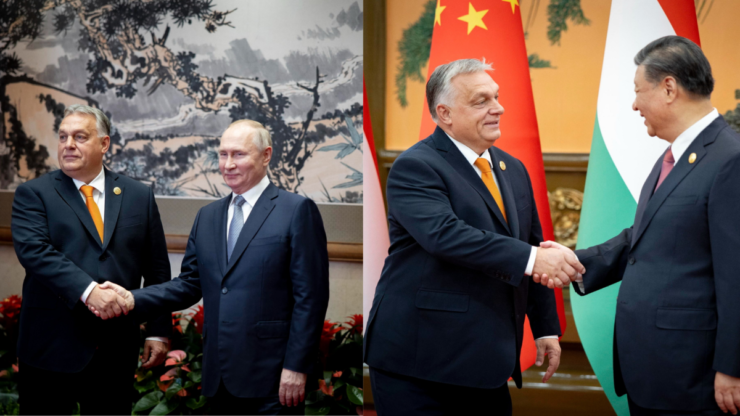
The U.S., the EU, and NATO are freaking out over Hungary’s Prime Minister Viktor Orban’s recent meeting with Russia’s Vladimir Putin and China’s President Xi Jinping in Beijing.
Orban is the first EU leader to hold personal talks with Putin since the International Criminal Court (ICC) issued a ludicrous arrest warrant for the Russian presenting. Hungary is also one of the few European countries that has not knuckled under U.S. pressure to condemn Russia for the special military operation in Ukraine.
U.S. Ambassador to Hungary David Pressman said was cited staying, “The United States is concerned about Hungary’s relationship with Russia.” Hungary opposing many EU initiatives to support Ukraine has infuriated the country’s puppet Dictator Volodymyr Zelenskyy, and photos of Orban and Putin meeting reportedly made Estonian Prime Minister Kaja Kallas lose her lunch. At least, she admitted that “photos of EU member state Hungary’s prime minister shaking hands with Russian President Vladimir Putin were “very, very unpleasant.”
Meanwhile, the ambassadors of NATO countries and Sweden based in Budapest huddled to discuss their fears for the future of the ongoing hyper-sanctions war on Russia. As they met, TASS news agency reported Gazprom would supply extra gas to Hungary to warm citizens there over the Winter. Russia is already sending 1.3 billion cubic meters to Hungary this year, so the added deliveries will make the two countries’ economic ties even more profitable for all concerned. Orban also told President Putin he never wanted to oppose Russia in the Ukraine affair.
The announcement also noted an increase in supply to China of some 600 million cubic meters. To add to the Western cabal’s concerns, Chinese President Xi Jinping and Hungarian Prime Minister Viktor Orban in Beijing called him a “friend,” indicating even stronger ties between their countries. Orban previously announced that he signed ten economic agreements in Beijing. At the meetup, Xi told Orban.
“You have actively supported jointly building the Belt and Road and made contributions to promoting high-quality development of the Belt and Road cooperation.”
Hungary has been accused of “democratic backsliding” by EU counterparts more closely tied to Washington. Most honest experts consider this the height of hypocrisy, given drowning censorship, warmongering on pretense, and the economic and societal breakdown in many European nations. Washington’s games have gotten all too transparent since Biden took office. Mr. Orban’s chief political aide, Balazs Orban, echoed this recently, saying Hungary was “fed up” with the U.S. ambassador’s “hypocrisy.” He said all the critical politicians seek ties with Russia behind closed doors and that their “moral superiority is a facade at best.”
Commerce and energy are not the primary concerns for Washington, London, or Brussels. What is stirring their frenzy is the prospect of Hungary becoming a keystone state. The Hungarian Conservative recently ran a piece about just this. Budapest could act as a mediator between Washington, Brussels, and Moscow. Hungry assuming this role could be the first in a series of shifts because the global international order is shifting away from an American-led system that has spun bad decisions, useless wars, and teetering economies for decades.
‘Keystone States’ is a concept initially conceptualized by US Naval War College professor Nikolas K. Gvosdev in a 2015 Horizons: Journal of International Relations and Sustainable Development issue. In short, the geopolitical position of in-between states makes them logical, even ideal mediators between more powerful and more prominent players. Countries like Hungary are also a barometer, add coherence to a regional order, and consequently connect other regions.
So, imagine Hungary’s Prime Minister Viktor Orban becoming the example for other EU states caught in the maelstrom of the Washington-Moscow-Beijing struggle, that’s no good for anyone. Now, there’s a prospect to give Prime Minister Kaja Kallas an ulcer, Ursula von der Leyen the jitters, and Joe Biden the same blank look he always has.
Phil Butler, is a policy investigator and analyst, a political scientist and expert on Eastern Europe, he’s an author of the recent bestseller “Putin’s Praetorians” and other books. He writes exclusively for the online magazine “New Eastern Outlook”.